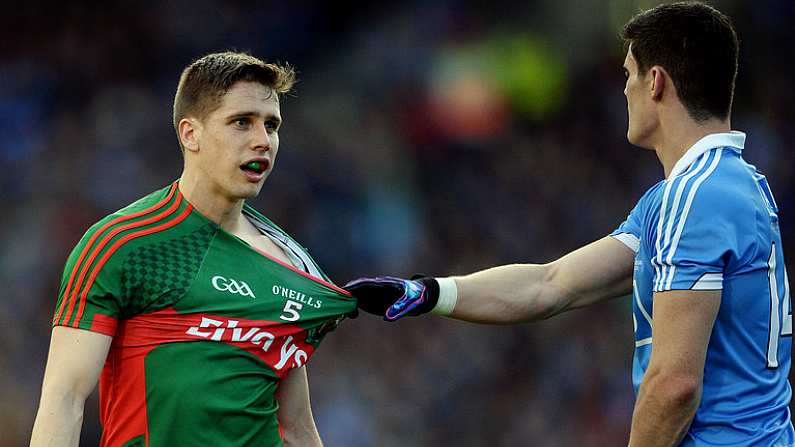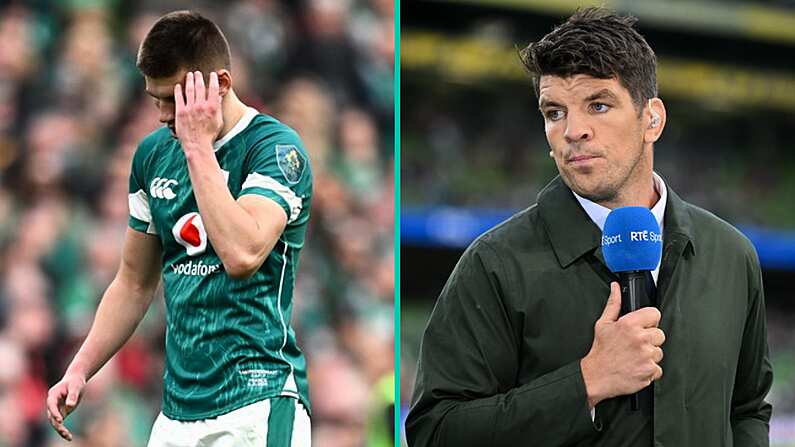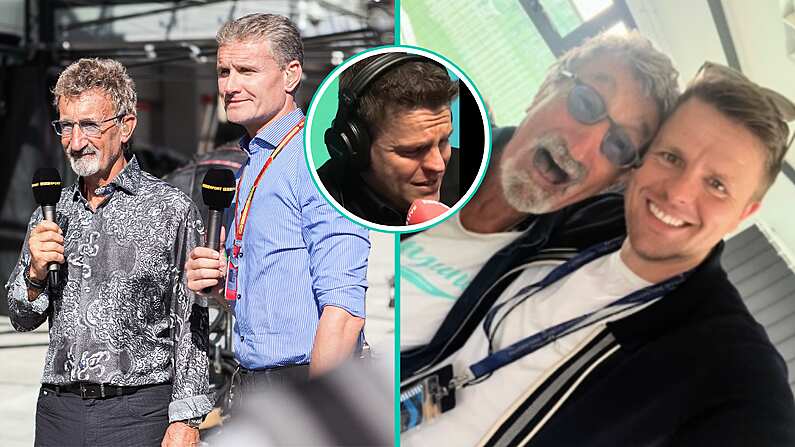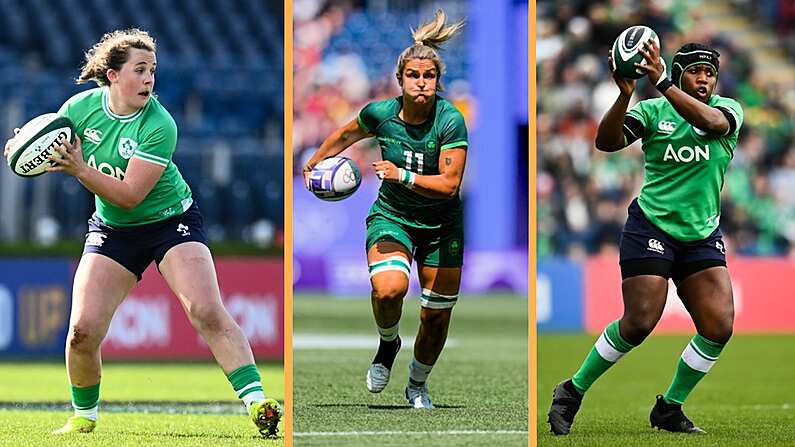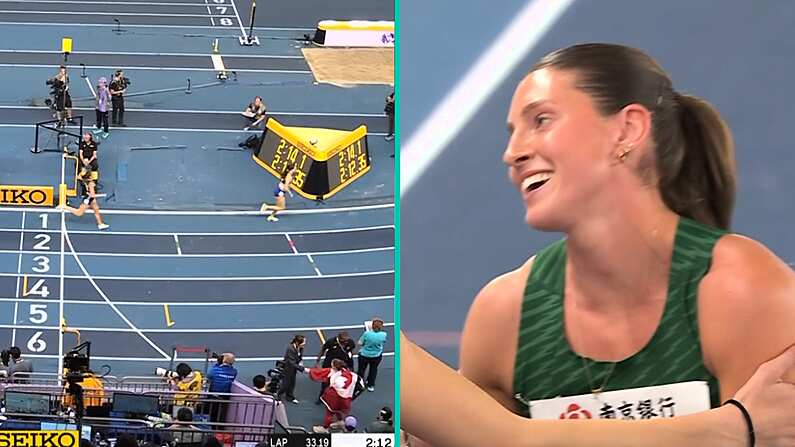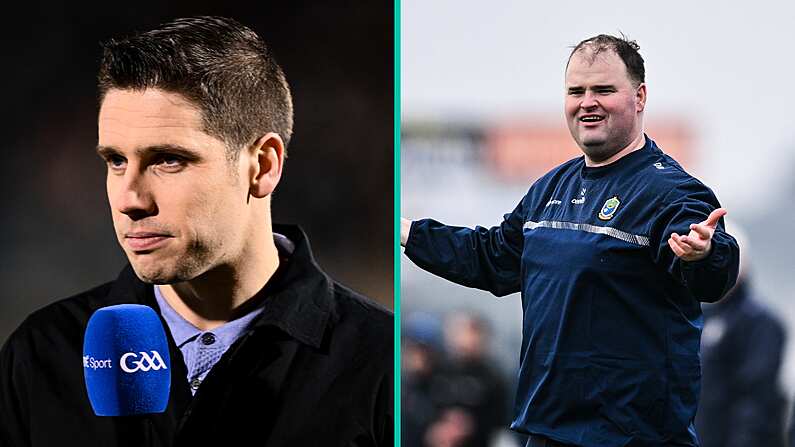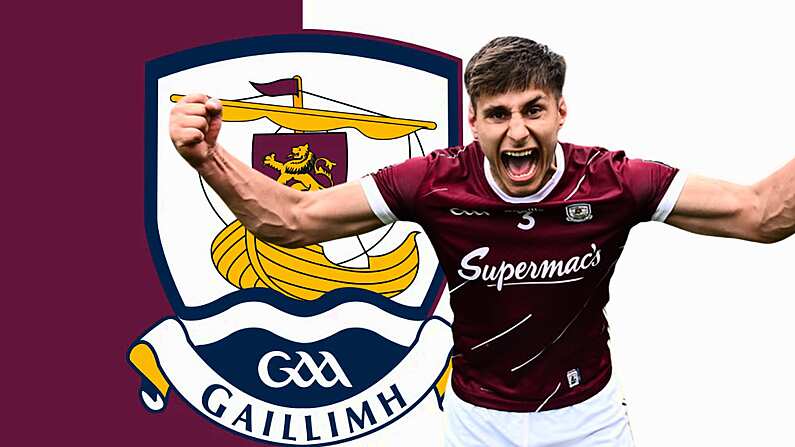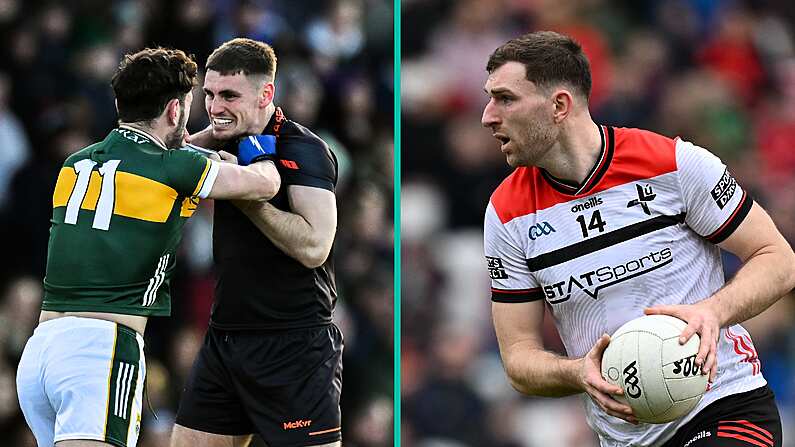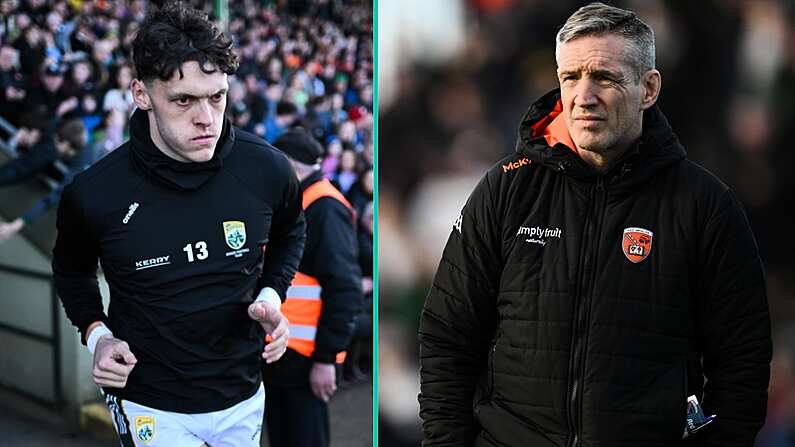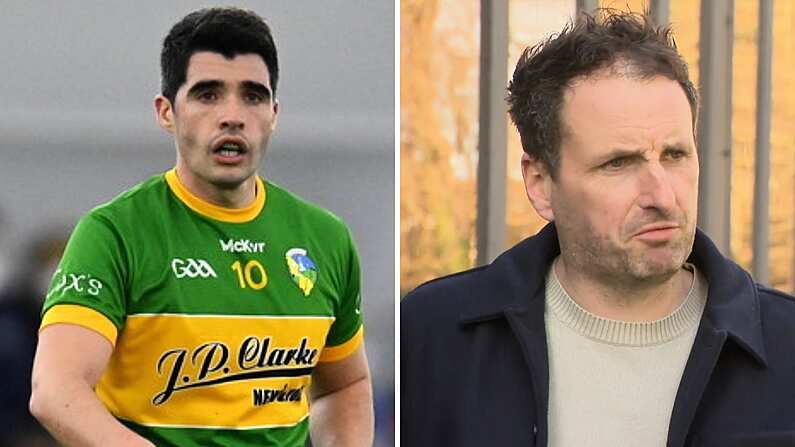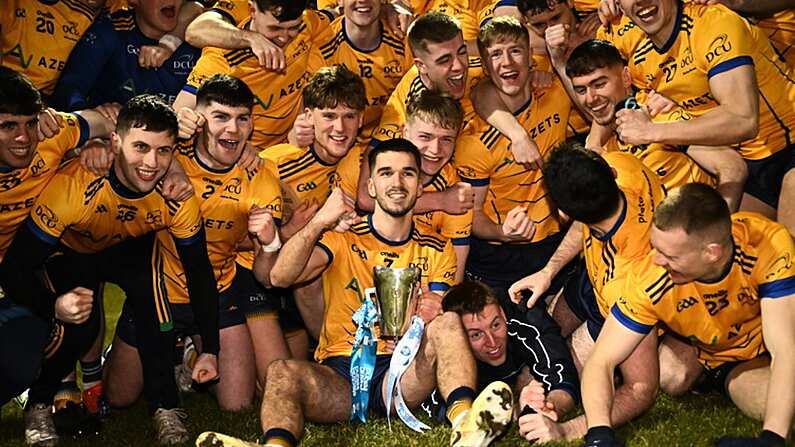From the so-called Mill at the Hill to 'the way they walk in Ballymun'.
No one is very surprised to see Dublin and Mayo line up in a final again this year.
Now, Mayo's had to go through their annual crisis. They lost to Galway, limped through qualifiers after extra-time, and were being written off casually, before finding the right time, as the always do.
It's not great surprise, because after last year, we knew we needed at least one more instalment. For, this is one of a great modern rivalries. And one characterised by growing bitterness too. Dublin and Mayo have met five times in the championship since 2006 - seven matches when you include the replays of the last two years.
In the previous forty years, they only met once, in the 1985 semi-final, a game which also went to a replay. Contrary to much of the rhetoric, Mayo's agony in All-Ireland finals is a relatively modern phenomenon. The 1989 final was their first appearance in a decider since they won in '51. In fact, in the quarter of a century between 1956 and 1980, Mayo only won two Connacht titles (admittedly, those two dates have been selected to maximise the 'wow' factor here).
In 1985, the Dubs won after a replay, earning the right to lose to Kerry in the All-Ireland final. Those were exciting games, memorable for Padraig Brogan's stunning goal in the drawn match. Also, a scene from Charlie Haughey's cheesy 'Ireland' documentary was filmed at the replay. Despite his Mayo roots, Charlie got a great kick out of the Dubs winning.
But the Dublin-Mayo rivalry has really kicked off with a famous semi final just over a decade ago. Here is the modern history.
2006
David Brady has since been collared as the man responsible for decreeing that Mayo would warm up in front of Hill 16.
A predictable perp, if we're being honest.
There was an impressive casualness about the manner in which Mayo ran down to the Hill. For all the world, it looked like they simply forgot that a rule had been passed at Congress stipulating that Dublin must warm up at the Hill before every game.
Nonchalance rather than outward defiance was the watchword as the Mayo players sauntered down to the Hill 16. They remained commendably indifferent to the jeering and whistling from the terrace.
Naturally the last thing the Dubs were going to do was defuse the situation by wandering down to the unfamiliar surrounds of the Canal End for their warm-up. That would have been an intolerable humiliation.
But then this alternative scenario emerges as wonderfully dignified when set alongside what actually happened. The Dublin players linked arms and marched solemnly towards the Hill, saluting their fans. Physical encounters were restricted to the respective management teams, as Pillar Caffrey barreled into the back of selector John Morrison.
The consensus in the RTE studio, which boasted the same lineup for the big games as it does now, was that Mayo's antics were "foolish".
Joe Brolly compared it to Willie Anderson eye-balling Buck Shelford during the Haka before Ireland's game against New Zealand in 1989.
"The All-Blacks beat them by about 57 points thereafter", Brolly remembered. The full-time score was 23-6 but that's a pedantic point.
It was widely believed that Dublin's time had come and that Mayo would be swept aside to make way for the dream final.
Colm O'Rourke said in his pre-match comments that "nobody expects Mayo to do much. The reality is that the vast majority of people going in here today and a lot of Mayo people will be just happy if Mayo put up a good show today."
The Irish Times star sports writer Tom Humphries had even written a (wonderful) book on the Dubs-Kerry rivalry of the 1970s, timed for release before Dublin met Kerry in the 2006 All-Ireland final.
It was a mild upset that Mayo had won Connacht at all. Galway had beaten them in Salthill the year before and were still generally regarded as the prime force in the west.
A narrow win over Laois after a quarter-final replay didn't make the world sit up and take notice.
The game itself was a rollercoaster, the kind that would have set Twitter ablaze had the phenomenon reached Ireland at that point.
Mayo started like a dream, roaring into a four point lead before the Dubs settled in. It wasn't until the 17th minute that Conal Keaney blasted over Dublin's first score.
Keaney it was who leveled the game at 1-2 to 0-5, passing in the rebound after Alan Brogan's original shot was repelled. Two injury time points, one of which came from Conor Mortimer whose radar was in perfect working order all day, left Mayo 0-9 to 1-5 ahead at half-time.
The third quarter belonged to Dublin. The positive spell was kick-started by Jason Sherlock palming the ball into an empty net after neat fist-passing interplay. After 46 minutes, the game looked gone from Mayo. The Dubs led 2-11 to 0-10.
A couple of points were followed by Andy Moran swinging around and slipping a goal. It was game on. Soon Mayo were ahead.
The RTE cameraman spent his time picking out anxious and depressed Dublin fans in the crowd. With four minutes left, Alan Brogan leveled the game but this set the scene for Ciaran McDonald's magnificent late winner.
2012
Pat Gilroy had dismantled the underachieving side of the late noughties and re-moulded the Dubs into a workmanlike outfit. They won an emotional All-Ireland title in his third year in charge, following a dramatic smash and grab victory over Kerry.
Though his initial instinct seemed to be to quit as soon as the All-Ireland was won, he decided - or was persuaded - to stay on for another year.
There was little fear yet that they were going to dominate forever and ever. The doomsday talk about splitting Dublin did not appear after the 2011 final.
People still weren't ready to believe that Mayo had the capability to win an All-Ireland. They reached an All-Ireland semi-final in James Horan's first year, stunning the All-Ireland champions Cork in the quarter-final, a game in which their chances had been very definitely dismissed beforehand.
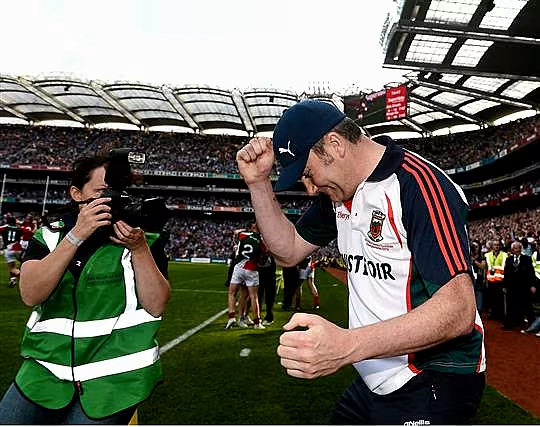
Brolly, who we're quoting plenty here, effectively declared that Cork would beat Mayo. This, he implied, was less a prediction than a statement of fact.
Mayo confounded the critics but were well shy of challenging Kerry in the semi-final, who won at a canter. All-Ireland titles weren't Mayo's level yet.
They had won two Connacht titles in a row but that was attributed to the alleged poverty of the opposition rather than Mayo's quietly burgeoning prowess.
Mayo played magnificently for the first 50 minutes, looking like they could kick points all day long. They led at half time and kicked for home in a glorious third quarter, leaving the sluggish Dubs flat-footed.
By 48 minutes, they led 0-16 to 0-7 and Jason Doherty missed a glorious chance to nail a goal.
"You could have started the scramble for tickets there and then", Darragh Maloney screamed.
From that serene position, Mayo ended up finishing the game a nervous wreck. The Dubs reduced the deficit to two points. Goalkeeper David Clarke made a marvellous save to keep the team ahead.
Mayo, in their late panic, were breathtakingly cynical in the closing stages. But then they would be the victims of similar tactics in following years.
2013
A curiously joyless and suffocating game given the style with which both teams had played en route.
While the full-time scoreline informs us that Dublin won by a point (2-12 to 1-14), it never really felt like a one-point game. Certainly, it lacked the drama of the 2011 final.
As in 1983, the Dubs effectively finished with two less men than their opponents, though neither Eoghan O'Gara nor Rory O'Carroll were sent off.
O'Gara couldn't move in the last ten minutes, while O'Carroll controversially disclosed later that he spent the last few minutes walking around in a daze and wasn't sure where he was. He was clearly concussed.
Dublin led by three points heading into injury-time, conceding two late points through frees.
Even as Mayo tagged on those late points, there was that nagging feeling that the horse had already bolted. Cillian O'Connor's straightforward free reducing the deficit to one point was the last time a Mayo player would touch the ball.
More than any other year, Mayo supporters believed that this was their year. After their quarter-final demolition of Donegal, the game which convinced many that they just had to do it this year, Joe Brolly even referred to them as "champions elect" on twitter.
"As for Aidan O'Shea, all I can say is 'Fuck Me'", he added.
But then they were unlucky to come of age at a time when the Dubs were revivified under Jim Gavin and frightening the life out of every other team in the country.
They won the League for the first time in twenty years and made even lighter work of Leinster than they had in the past.
Suddenly, the looked unstoppable.
It was in February that year when Colm O'Rourke penned the first split Dublin proposal, highlighting the manner in which they were chewing up teams in the underage grades and prophesying that they would continue to
It was a testament to Mayo's form that entered the game as the slightest of underdogs.
2013. must rank as probably the most hyped All-Ireland football final ever played. Dorset Street pubs were jammed with people who'd traveled up from Mayo without a ticket but who wanted to at least savour the atmosphere of the surrounding area.
The match failed to live up to the hype.
The full-time whistle was greeted with an even greater than normal level of Mayo anguish. Unbearably, they had now lost seven All-Ireland finals in a quarter of a century.
One Dubliner informs Balls that he let a yelp of relief out of him at the final whistle but his mood quickly turned to one of sympathy for Mayo fans.
John O'Mahony and his wife came walking past him. O'Mahony, he says, looked depressed and just wanted to get out of there. His wife appeared almost stricken with grief and breathlessly shook his hand and told him "ye deserved it". But she seemed ready to cry.
2015
"The way we walk in Ballymun"
The drawn game was a classic example of an exciting finish making up for a humdrum opening. At half-time, social media was grumbling about the stop-start nature of the contest.
A late, generously awarded penalty allowed Mayo to escape with a draw. Andy Moran lobbed over the equaliser seconds after Cillian O'Connor slotted the pen. As it was, Mayo had all the momentum and could have won there and then.
The aftermath was a bonanza for the papers and sports websites. Philly McMahon and Aidan O'Shea were sniping at each other, verbally and physically, all afternoon.
There was much chatter about whether Philly had head-butted O'Shea. Video footage suggested there was something in it.
Celebrated referee Pat McEnaney told Balls.ie:
Philly McMahon, did it clearly show that he struck with his head? I would say there is no clear striking of the head. Yes, he put his head forward. Yes, the other boy put his head slightly forward. But as someone would say, that's how they walk in Ballymun anyway!
A wound-up member of Fingal County Council demanded an apology.
In the frantic finale, the magnificent Lee Keegan decided that Diarmuid Connolly was much too dangerous to be allowed saunter up the field either with or without the ball.
With disarming frankness, he decided to simply pull him to the ground. Wrapped in a headlock, Connolly swung a dig and got the line.
The week would be dominated by endless discussion about whether Connolly would be free to play the next day. The alphabet soup of GAA disciplinary bodies had made a mess of things by inexplicably clearing Mayo's Kevin Keane to play in the semi-final.
By rights, Connolly should have been banned but we learned on Saturday morning that he was free to play.
Galway's Damien Comer tweeted his sympathy for Connolly, perhaps motivated by his own history with Keegan, which dated back to the final moments of the Connacht semi-final game.
The replay forced the Electric Picnic organisers to abandon their hostility to big screens at the Picnic. Festival purists no doubt look down their nose at the cavemen who are demanding sport at the Picnic. The purists surely regard the sight of 'GAH' jerseys within the grounds as a further sign of its alleged deterioration. In their eyes, the last thing the organisers should be doing is making the games easier to see, lest it encourage that element.
But the pull of Dublin-Mayo was too great to resist.
Mayo led by four points midway through the second half following Cillian O'Connor's expertly taken goal. But, in the fatal period shortly afterwards, they dawdled and failed to kick on when the Dubs lay twitching on the canvas.
Unlike in 2012, when the Dubs sucker punch came, they'd no cushion built up. In a late blitz, the Dubs blew them away, hitting three goals and tagging on extra points. There were seven in it at the end.
Philly scored the second Dublin goal which put them three points clear.
It's the way ballymun people walk ?
— Philly Mc Mahon (@PhillyMcMahon) September 5, 2015
2016

You play a team in August or September four times in four years, and things are going to get a bit feisty. On the fifth year, you meet again in the All-Ireland and things are liable to blow up.
It didn't take long for that to happen in the 2016 final. In fact, the teams didn't even make it out of the tunnel without coming to blows, something to particularly horrified Midwest Radio co-commentator John Casey.
The first game had a bit of everything, when it eventually got started.
The rainy conditions seemed to just add to the feistiness of the whole thing. Mayo conceding two own goals in the first half, James McCarthy's controversial black card, high and late hits galore, an incredible equalising point late in injury time from Cillian O'Connor make it quite the occassion already before a final schmozzle right at the end led to even worse feelings than there had already been.
O'Connor, Philly McMahon, John Small and a Mayo "Maor" were at the centre of it all, and referee Conor Lane seemed happy enough to let lads do whatever they wanted.
Mostly though, the first game will be remembered for the jersey ripping encounter between Lee Keegan and Diarmuid Connolly.
By the time the replay came around, things were more than a bit testy.
The first half, Lee Keegan's brilliant goal was probably undermined by black cards for both himself (after another tussle with Connolly) and Johnny Cooper.
Then just before half time, Maurice Deegan lost all control.
Things weren't as frantic in the second half however. Rob Hennelly conceded a penalty and was black carded for fouling Paddy Andrews, a move that would ultimately be the difference, as Dublin won by a single point in the end.
In the aftermath and since, both sides talk liberally about targeting of certain players, and even of each side gathering up legions of past players to talk up such targeting. "Influencing the referee" was become to the Mayo Dublin rivalry what "Fake News" is to American politics. Both sides tag the other with it so much it has basically become meaningless.
Are things to get even more tetchy in 2017? It's hard to see how they won't.
SEE ALSO: Impact Sub To Footballer Of The Year Contender - A Career Great Season For Andy Moran

